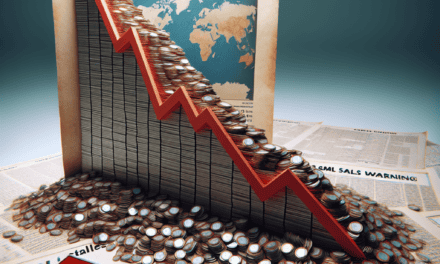“Hungary Joins Forces with Allies to Tackle Rising Oil Prices Amid US Sanctions.”
Introduction
Hungary is actively collaborating with its allies to tackle the challenges posed by rising oil prices, particularly in the context of ongoing U.S. sanctions that have impacted global energy markets. As a landlocked nation in Central Europe, Hungary relies heavily on imported energy, making it vulnerable to fluctuations in oil prices. In response to these economic pressures, the Hungarian government is engaging in diplomatic discussions and strategic partnerships with neighboring countries and other allies to secure stable energy supplies and explore alternative energy sources. This collaborative approach aims to mitigate the adverse effects of sanctions and ensure energy security for Hungary’s economy and its citizens.
Hungary’s Strategic Partnerships in Energy Security
Hungary’s strategic partnerships in energy security have become increasingly vital in the context of rising oil prices and the geopolitical landscape shaped by U.S. sanctions. As a landlocked nation in Central Europe, Hungary has historically relied on a mix of domestic production and imports to meet its energy needs. However, the recent fluctuations in global oil markets, exacerbated by sanctions imposed on key oil-producing nations, have prompted Hungary to reassess its energy strategies and seek collaborative solutions with its allies.
In light of these challenges, Hungary has turned to its regional partners to bolster its energy security. The country has engaged in discussions with neighboring states, particularly those within the Visegrád Group, which includes Poland, the Czech Republic, and Slovakia. This collaboration aims to create a more resilient energy network that can withstand external shocks and mitigate the impact of rising oil prices. By sharing resources and infrastructure, these nations can enhance their collective bargaining power in the global energy market, thereby reducing their vulnerability to price volatility.
Moreover, Hungary has sought to diversify its energy sources by exploring partnerships beyond its immediate region. The country has engaged with energy-rich nations, such as Azerbaijan and Kazakhstan, to secure alternative oil supplies. These partnerships not only provide Hungary with access to more stable energy sources but also contribute to the broader goal of reducing dependence on traditional suppliers. By fostering these relationships, Hungary is positioning itself as a key player in the evolving energy landscape of Europe, where energy security is increasingly intertwined with geopolitical considerations.
In addition to bilateral agreements, Hungary has also participated in multilateral initiatives aimed at enhancing energy cooperation within the European Union. The EU has recognized the importance of energy security as a fundamental component of its overall strategy, particularly in light of the ongoing tensions with Russia. Hungary’s involvement in EU-led projects, such as the Energy Union, underscores its commitment to a unified approach to energy security. By aligning its national policies with EU objectives, Hungary not only strengthens its own energy resilience but also contributes to the stability of the entire region.
Furthermore, Hungary’s strategic partnerships extend to the realm of renewable energy. As the global community increasingly prioritizes sustainability, Hungary has begun to invest in renewable energy projects in collaboration with its allies. By harnessing the potential of solar, wind, and biomass energy, Hungary aims to reduce its reliance on fossil fuels and mitigate the impact of rising oil prices. These initiatives not only enhance energy security but also align with broader environmental goals, demonstrating Hungary’s commitment to a sustainable energy future.
In conclusion, Hungary’s strategic partnerships in energy security are crucial in addressing the challenges posed by rising oil prices and U.S. sanctions. Through collaboration with regional allies and engagement with energy-rich nations, Hungary is working to diversify its energy sources and enhance its resilience in an increasingly volatile market. By participating in EU initiatives and investing in renewable energy, Hungary is not only securing its own energy future but also contributing to the stability and sustainability of the broader European energy landscape. As the geopolitical landscape continues to evolve, Hungary’s proactive approach to energy security will be essential in navigating the complexities of the global energy market.
The Impact of US Sanctions on Hungary’s Oil Supply
The impact of US sanctions on Hungary’s oil supply has become increasingly pronounced in recent years, particularly as geopolitical tensions have escalated. As a member of the European Union, Hungary has found itself navigating a complex landscape shaped by both regional dynamics and the broader implications of US foreign policy. The sanctions, primarily aimed at curbing the influence of certain nations, have inadvertently affected Hungary’s energy security, compelling the nation to reassess its oil supply strategies.
In the wake of these sanctions, Hungary has experienced fluctuations in oil prices, which have placed significant pressure on its economy. The rising costs of crude oil have not only affected consumers at the pump but have also had a cascading effect on various sectors reliant on oil, including transportation and manufacturing. Consequently, the Hungarian government has been prompted to explore alternative avenues to stabilize its oil supply and mitigate the adverse effects of these sanctions.
To address these challenges, Hungary has sought to strengthen its collaborations with allies, particularly within the European Union. By fostering closer ties with neighboring countries, Hungary aims to create a more resilient energy network that can withstand external pressures. This collaborative approach is essential, as it allows for the sharing of resources and information, ultimately enhancing the collective ability to respond to market fluctuations and supply disruptions.
Moreover, Hungary has been actively engaging in discussions with energy suppliers outside the influence of US sanctions. By diversifying its sources of oil, Hungary can reduce its dependency on any single supplier, thereby enhancing its energy security. This strategy not only helps to stabilize prices but also positions Hungary as a more formidable player in the regional energy market. As a result, the government has been exploring partnerships with countries that are not subject to the same sanctions, thereby ensuring a more stable and reliable oil supply.
In addition to diversifying its sources, Hungary has also been investing in infrastructure improvements to facilitate the transportation and storage of oil. By modernizing its oil pipelines and storage facilities, Hungary can enhance its capacity to manage supply fluctuations more effectively. This investment in infrastructure is crucial, as it not only supports the immediate needs of the economy but also lays the groundwork for long-term energy sustainability.
Furthermore, Hungary’s commitment to renewable energy sources has gained momentum in light of the challenges posed by rising oil prices and sanctions. By investing in alternative energy solutions, Hungary aims to reduce its reliance on fossil fuels and create a more sustainable energy future. This transition not only aligns with global trends toward decarbonization but also serves as a strategic move to insulate the economy from the volatility of oil markets.
In conclusion, the impact of US sanctions on Hungary’s oil supply has prompted a multifaceted response from the Hungarian government. By collaborating with allies, diversifying oil sources, investing in infrastructure, and embracing renewable energy, Hungary is taking proactive steps to address the challenges posed by rising oil prices. This comprehensive approach not only seeks to stabilize the economy in the short term but also aims to build a more resilient and sustainable energy landscape for the future. As Hungary navigates these complexities, its ability to adapt and innovate will be crucial in ensuring energy security and economic stability in an increasingly uncertain global environment.
Collaborative Efforts to Mitigate Rising Oil Prices
In recent months, Hungary has found itself navigating the complex landscape of rising oil prices, a situation exacerbated by the imposition of sanctions by the United States on various oil-producing nations. As a landlocked country in Central Europe, Hungary relies heavily on imported oil to meet its energy needs, making it particularly vulnerable to fluctuations in global oil markets. In response to this challenge, Hungary has initiated collaborative efforts with its allies to mitigate the impact of rising oil prices on its economy and ensure energy security for its citizens.
One of the primary strategies Hungary has employed is to strengthen its partnerships within the European Union. By engaging in dialogue with other member states, Hungary aims to create a unified approach to energy procurement and pricing. This collaboration is essential, as it allows Hungary to leverage collective bargaining power when negotiating oil contracts, potentially securing more favorable terms and prices. Furthermore, by sharing resources and information regarding oil supply chains, Hungary and its allies can better anticipate market trends and adjust their strategies accordingly.
In addition to intra-EU collaboration, Hungary has also sought to diversify its energy sources. This diversification is crucial in reducing dependency on any single supplier, particularly in light of the sanctions that have disrupted traditional supply routes. By exploring alternative energy partnerships, such as those with countries in the Middle East and North Africa, Hungary can access a broader range of oil supplies. This approach not only enhances energy security but also fosters economic ties with nations that may offer more stable pricing structures.
Moreover, Hungary has been proactive in participating in international forums focused on energy policy and market stability. By engaging with organizations such as the International Energy Agency (IEA) and the Organization of the Petroleum Exporting Countries (OPEC), Hungary can gain insights into global oil market dynamics and collaborate on strategies to stabilize prices. These interactions are vital, as they provide Hungary with a platform to voice its concerns and advocate for measures that can alleviate the financial burden of rising oil costs on its economy.
In tandem with these diplomatic efforts, Hungary has also invested in domestic energy infrastructure to enhance its resilience against external shocks. By modernizing refineries and expanding storage capacities, Hungary aims to create a buffer that can absorb price fluctuations and supply disruptions. This investment not only strengthens Hungary’s energy independence but also positions the country as a more reliable partner for its allies in times of crisis.
Furthermore, Hungary’s commitment to renewable energy sources plays a significant role in its long-term strategy to combat rising oil prices. By increasing the share of renewables in its energy mix, Hungary can reduce its reliance on fossil fuels and mitigate the impact of global oil price volatility. This transition not only aligns with broader EU goals of sustainability but also enhances Hungary’s energy security by providing alternative sources of power.
In conclusion, Hungary’s collaborative efforts with its allies to address rising oil prices amid US sanctions reflect a multifaceted approach that combines diplomacy, diversification, and domestic investment. By working closely with European partners and engaging in international energy discussions, Hungary is taking significant steps to safeguard its economy and ensure a stable energy future. As the global energy landscape continues to evolve, these collaborative initiatives will be crucial in navigating the challenges posed by fluctuating oil prices and securing a sustainable energy supply for the nation.
Hungary’s Role in European Energy Alliances
Hungary’s strategic position in the heart of Europe has increasingly made it a focal point for energy discussions, particularly in light of rising oil prices exacerbated by US sanctions on various countries. As the European Union grapples with the implications of these sanctions, Hungary has taken proactive steps to collaborate with its allies, ensuring energy security while navigating the complexities of international relations. This collaboration is not merely a response to immediate challenges; it reflects Hungary’s long-term vision of energy independence and regional stability.
In recent years, Hungary has sought to diversify its energy sources, reducing reliance on any single supplier. This diversification strategy is crucial, especially as geopolitical tensions can disrupt traditional supply chains. By engaging with neighboring countries and forming alliances, Hungary aims to create a more resilient energy network. For instance, Hungary has strengthened its ties with countries in the Balkans and Central Europe, fostering a collaborative approach to energy procurement and infrastructure development. This regional cooperation is essential in mitigating the impact of external pressures, such as sanctions that can lead to volatile oil prices.
Moreover, Hungary’s participation in European energy initiatives underscores its commitment to collective action. The country has been an active participant in discussions surrounding the European Green Deal, which aims to transition the continent towards sustainable energy solutions. By aligning its energy policies with broader European goals, Hungary not only enhances its own energy security but also contributes to the stability of the entire region. This alignment is particularly important as the EU seeks to reduce its dependence on fossil fuels and invest in renewable energy sources, thereby addressing both economic and environmental concerns.
In addition to fostering regional alliances, Hungary has also explored partnerships beyond Europe. By engaging with countries rich in energy resources, Hungary is working to secure alternative oil supplies that can buffer against the fluctuations caused by sanctions. These partnerships are not limited to traditional oil-producing nations; they also include emerging markets that offer potential for collaboration in energy production and technology. Such initiatives are vital for Hungary as it seeks to maintain a competitive edge in a rapidly changing global energy landscape.
Furthermore, Hungary’s government has recognized the importance of domestic energy production as a means to enhance national security. Investments in local energy projects, including renewable energy and nuclear power, are part of a broader strategy to reduce vulnerability to external shocks. By bolstering its domestic energy capabilities, Hungary aims to create a more self-sufficient energy system that can withstand the pressures of international sanctions and market volatility.
As Hungary navigates these complex dynamics, it remains committed to engaging with its allies to address the challenges posed by rising oil prices. The collaborative efforts undertaken by Hungary and its partners are not only aimed at immediate relief but also at establishing a sustainable energy framework for the future. By prioritizing regional cooperation, diversifying energy sources, and investing in domestic production, Hungary is positioning itself as a key player in the European energy landscape. This proactive approach not only enhances Hungary’s energy security but also contributes to the overall stability and resilience of the European energy market in the face of ongoing geopolitical challenges. In this context, Hungary’s role in European energy alliances is not just significant; it is essential for navigating the complexities of a rapidly evolving global energy environment.
Innovative Solutions for Oil Price Stabilization
In the face of escalating oil prices, Hungary has embarked on a collaborative journey with its allies to devise innovative solutions aimed at stabilizing the market. The recent sanctions imposed by the United States have significantly impacted global oil supply chains, prompting countries to reassess their energy strategies. As Hungary grapples with the repercussions of these sanctions, it recognizes the necessity of fostering partnerships that can lead to effective and sustainable solutions.
One of the primary strategies Hungary is exploring involves diversifying its energy sources. By reducing reliance on a single supplier, the country aims to mitigate the risks associated with fluctuating oil prices. This diversification not only enhances energy security but also opens avenues for collaboration with neighboring countries that may have access to alternative energy resources. For instance, Hungary is actively engaging in discussions with its Central European partners to establish a regional energy market that promotes the sharing of resources and stabilizes prices across the board.
Moreover, Hungary is investing in renewable energy technologies as a long-term solution to the volatility of oil prices. By harnessing wind, solar, and biomass energy, the country seeks to reduce its dependence on fossil fuels. This transition not only aligns with global sustainability goals but also positions Hungary as a leader in the green energy sector within the region. Collaborative projects with allies in research and development of renewable technologies are already underway, showcasing Hungary’s commitment to innovation in energy production.
In addition to diversifying energy sources and investing in renewables, Hungary is also exploring strategic reserves as a buffer against price shocks. By building up its strategic oil reserves, the country can better withstand sudden spikes in oil prices caused by geopolitical tensions or supply disruptions. This proactive approach not only provides a safety net for the economy but also demonstrates Hungary’s commitment to maintaining stability in the energy market.
Furthermore, Hungary is leveraging its position within the European Union to advocate for collective action among member states. By promoting policies that encourage energy efficiency and conservation, Hungary aims to reduce overall demand for oil, thereby alleviating some of the pressure on prices. Collaborative initiatives, such as joint investments in energy infrastructure and shared research on alternative fuels, are essential components of this strategy. Through these efforts, Hungary seeks to foster a unified response to the challenges posed by rising oil prices.
As Hungary navigates the complexities of the current energy landscape, it is also mindful of the importance of engaging with international organizations and forums. By participating in discussions at platforms such as the International Energy Agency, Hungary can share its experiences and learn from the strategies employed by other nations facing similar challenges. This exchange of ideas is crucial for developing innovative solutions that can be adapted to the unique circumstances of each country.
In conclusion, Hungary’s collaborative efforts with its allies to address rising oil prices amid US sanctions reflect a multifaceted approach to energy stabilization. By diversifying energy sources, investing in renewable technologies, building strategic reserves, and advocating for collective action within the EU, Hungary is positioning itself to navigate the complexities of the global oil market. Through these innovative solutions, the country not only aims to stabilize its own economy but also contributes to a more resilient and sustainable energy future for the region.
The Future of Hungary’s Energy Policy Amid Global Challenges
As Hungary navigates the complexities of a rapidly changing global energy landscape, the future of its energy policy is increasingly shaped by both domestic priorities and international dynamics. The recent surge in oil prices, exacerbated by US sanctions on key energy producers, has prompted Hungary to reassess its energy strategies and seek collaborative solutions with its allies. This situation underscores the importance of a multifaceted approach to energy security, which is essential for maintaining economic stability and ensuring the well-being of its citizens.
In light of these challenges, Hungary has recognized the necessity of diversifying its energy sources. Historically reliant on oil and gas imports, particularly from Russia, the country is now exploring alternative suppliers and energy routes. This shift is not merely a reaction to current geopolitical tensions but also a proactive measure to enhance energy independence. By fostering relationships with neighboring countries and engaging in regional energy initiatives, Hungary aims to create a more resilient energy framework that can withstand external shocks.
Moreover, Hungary’s collaboration with allies extends beyond mere procurement of energy resources. The country is actively participating in joint projects that focus on renewable energy development, which is increasingly seen as a cornerstone of sustainable energy policy. By investing in solar, wind, and biomass energy, Hungary is not only addressing immediate energy needs but also contributing to long-term environmental goals. This dual focus on sustainability and security reflects a growing recognition that energy policy must align with broader economic and ecological objectives.
Transitioning to renewable energy sources, however, presents its own set of challenges. The initial investment costs, technological requirements, and the need for infrastructure development are significant hurdles that Hungary must overcome. Nevertheless, the potential benefits of a diversified energy portfolio are substantial. By reducing dependence on fossil fuels, Hungary can mitigate the impact of volatile oil prices and enhance its energy security. Furthermore, the transition to renewables aligns with the European Union’s broader climate goals, positioning Hungary as a proactive participant in the global effort to combat climate change.
In addition to diversifying energy sources, Hungary is also focusing on improving energy efficiency. This approach not only reduces overall consumption but also lowers costs for consumers and businesses alike. By implementing energy-saving measures and promoting the use of energy-efficient technologies, Hungary can alleviate some of the financial pressures associated with rising oil prices. This strategy is particularly relevant in the context of the current economic climate, where inflation and energy costs are significant concerns for households and industries.
As Hungary moves forward, the importance of international cooperation cannot be overstated. Engaging with allies and participating in multilateral forums will be crucial for addressing the complexities of energy security in an interconnected world. By sharing best practices, technologies, and resources, Hungary can enhance its own energy resilience while contributing to regional stability. This collaborative spirit is essential not only for navigating the immediate challenges posed by rising oil prices but also for laying the groundwork for a sustainable energy future.
In conclusion, Hungary’s energy policy is at a pivotal juncture, shaped by both external pressures and internal aspirations. By embracing diversification, investing in renewables, and enhancing energy efficiency, Hungary is positioning itself to meet the challenges of a dynamic global energy landscape. Through collaboration with allies and a commitment to sustainable practices, Hungary can secure its energy future while contributing to broader regional and global goals.
Hungary’s Diplomatic Approach to Oil Price Negotiations
In recent months, Hungary has found itself navigating a complex geopolitical landscape shaped by rising oil prices and the implications of U.S. sanctions on various nations. As a landlocked country in Central Europe, Hungary’s energy security is intricately linked to its diplomatic relationships, particularly with its neighbors and other key players in the energy market. In response to the escalating oil prices, which have been exacerbated by sanctions and global supply chain disruptions, Hungary has adopted a proactive diplomatic approach aimed at negotiating favorable terms for its energy imports.
To begin with, Hungary has recognized the necessity of engaging in dialogue with its traditional allies, as well as exploring new partnerships that could provide alternative sources of oil. This strategy is particularly important given the country’s reliance on imports to meet its energy needs. By fostering relationships with countries that are not subject to U.S. sanctions, Hungary aims to diversify its energy supply and mitigate the impact of rising prices. This diversification is not merely a matter of economic necessity; it is also a strategic move to enhance national security and reduce vulnerability to external pressures.
Moreover, Hungary’s government has been actively participating in regional discussions with fellow European Union members to address the collective challenges posed by rising oil prices. These discussions have often centered around the need for a unified response to the sanctions imposed by the United States, which have had far-reaching effects on global oil markets. By collaborating with other EU nations, Hungary seeks to leverage collective bargaining power, thereby increasing the likelihood of securing more favorable oil prices and terms of trade. This collaborative approach underscores the importance of solidarity within the EU, particularly in times of economic uncertainty.
In addition to regional cooperation, Hungary has also been exploring bilateral agreements with oil-producing countries that are not aligned with U.S. foreign policy. This has involved high-level diplomatic visits and negotiations aimed at establishing long-term contracts that could provide Hungary with stable and affordable oil supplies. Such agreements are crucial for Hungary, as they not only help to stabilize prices but also ensure a reliable flow of energy resources essential for the country’s economy.
Furthermore, Hungary’s diplomatic efforts extend to engaging with international organizations and forums that address energy security and market stability. By participating in these platforms, Hungary can advocate for policies that support its interests while also contributing to broader discussions on energy sustainability and resilience. This engagement is vital, as it allows Hungary to position itself as a proactive player in the global energy landscape, rather than a passive recipient of external decisions.
As Hungary continues to navigate the complexities of rising oil prices amid U.S. sanctions, its diplomatic approach remains a cornerstone of its strategy. By fostering alliances, engaging in regional cooperation, and pursuing bilateral agreements, Hungary is working diligently to secure its energy future. This multifaceted approach not only aims to alleviate the immediate pressures of rising oil costs but also seeks to establish a more resilient energy framework for the long term. In doing so, Hungary is not only addressing current challenges but also laying the groundwork for a more secure and sustainable energy landscape in the years to come.
Q&A
1. **Question:** What measures is Hungary taking to address rising oil prices amid US sanctions?
**Answer:** Hungary is collaborating with its allies to explore alternative oil supply routes and negotiate better pricing agreements.
2. **Question:** How are US sanctions impacting Hungary’s oil supply?
**Answer:** US sanctions have restricted Hungary’s access to certain oil imports, leading to increased prices and supply challenges.
3. **Question:** Which allies is Hungary working with to mitigate the effects of rising oil prices?
**Answer:** Hungary is working with neighboring countries in the European Union and other regional partners to secure stable oil supplies.
4. **Question:** What strategies are being considered by Hungary to stabilize oil prices?
**Answer:** Hungary is considering diversifying its energy sources, increasing domestic production, and investing in renewable energy.
5. **Question:** How does Hungary’s oil dependency affect its economy?
**Answer:** Hungary’s economy is significantly affected by oil prices, as high costs can lead to inflation and increased transportation expenses.
6. **Question:** What role does the European Union play in Hungary’s oil supply strategy?
**Answer:** The European Union facilitates discussions among member states to ensure energy security and may provide financial support for alternative energy projects.
7. **Question:** Are there any long-term plans for Hungary to reduce its reliance on oil?
**Answer:** Yes, Hungary is investing in renewable energy sources and enhancing energy efficiency to reduce long-term reliance on oil.
Conclusion
Hungary’s collaboration with its allies to address rising oil prices amid US sanctions reflects a strategic approach to mitigate economic challenges. By fostering partnerships and seeking alternative energy sources, Hungary aims to stabilize its energy market and ensure energy security while navigating the complexities of international sanctions. This cooperative effort underscores the importance of solidarity among nations in facing global economic pressures and highlights Hungary’s proactive stance in safeguarding its national interests.





